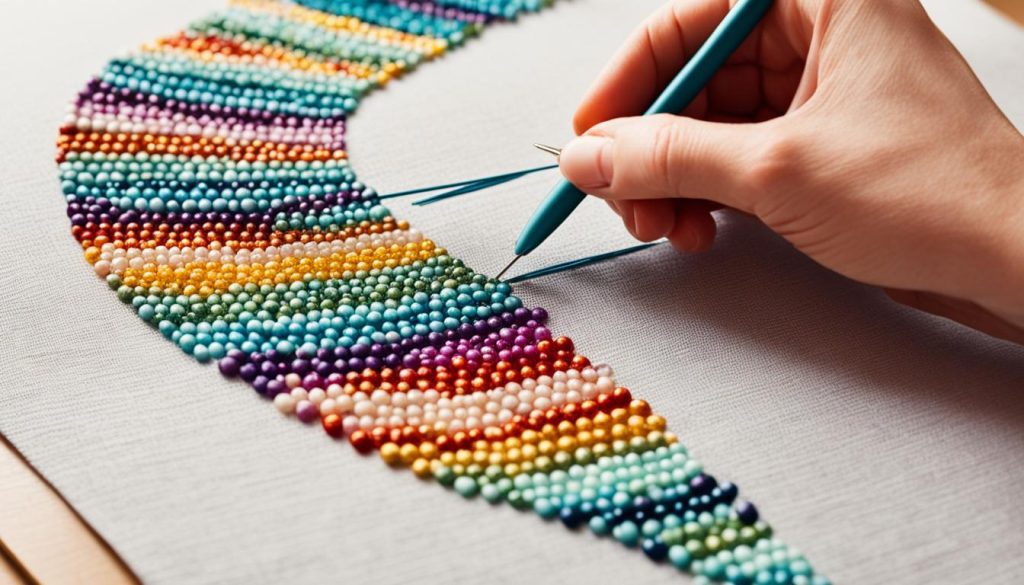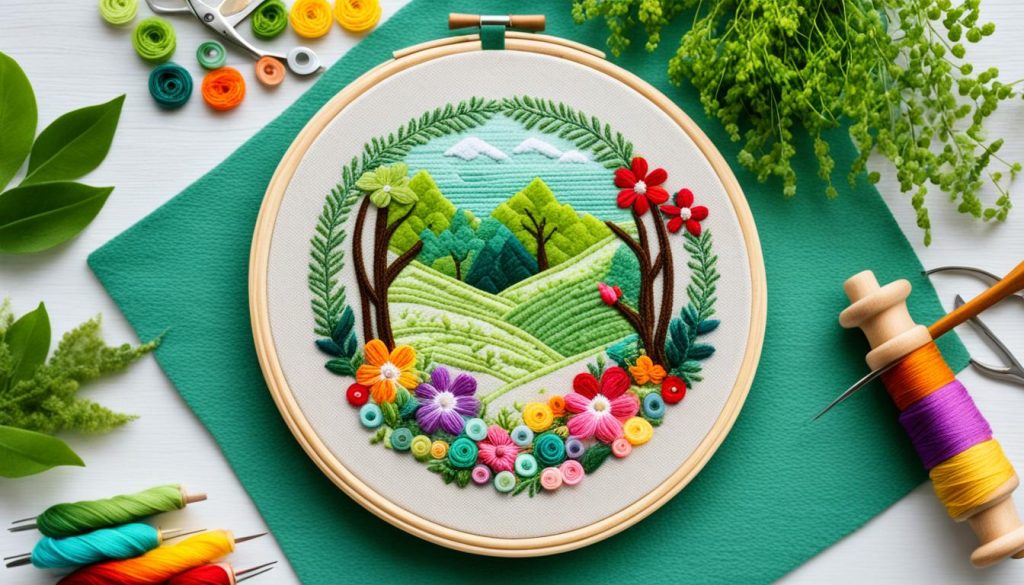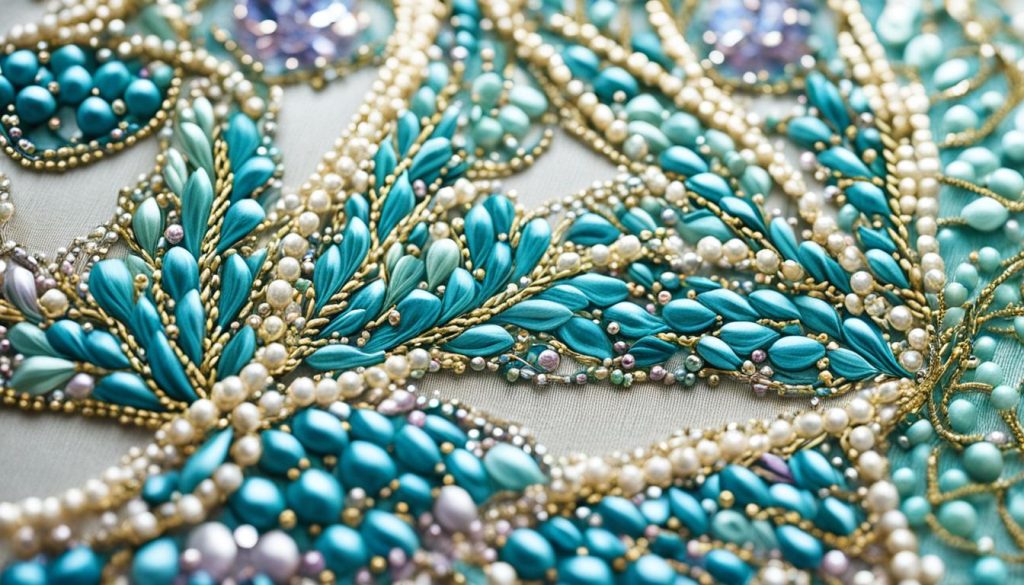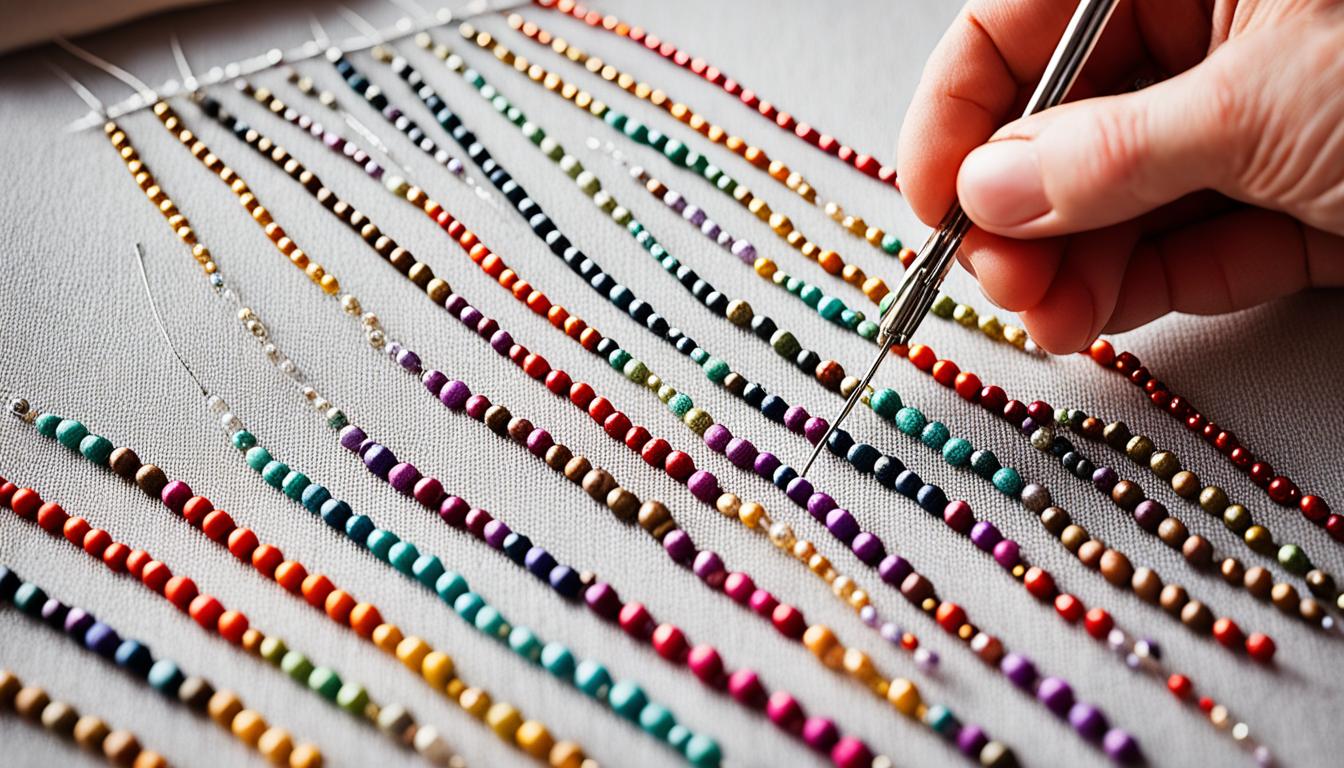All the embroidery designs we love are not the same. Some stand out with amazing textures and colors. This magic is in beaded embroidery, a skill some experts keep hidden. It’s becoming more popular. So, many hobbyists are now adding beads to their embroidery projects.
Needle ‘n Thread is a top place for everything embroidery. They’ve made finding beaded embroidery tutorials easy with new visual indexes. Now, learning new stitches and techniques like Drizzle Stitch and Beaded Chain Stitch is simpler. Their latest posts are always visible, ensuring there’s something new to learn. And for those who want to get better, they review key books like Bead Embroidery: RSN Essential Stitch Guide.
But, what really makes it exciting is the part where you get to share your ideas. Needle ‘n Thread asks its readers for suggestions on what to cover next. This keeps the content fresh and pushes the limits of embroidery. Thanks to people like Imogen Rhodes-Davies, beaded embroidery keeps getting better and more current.
Key Takeaways
- Beaded embroidery combines texture and color for a 3D effect.
- Needle ‘n Thread offers 12 detailed beaded embroidery tutorials.
- The website’s new visual index makes searching for tutorials easier.
- Reader input is encouraged for future tutorial topics.
- Modern beaded embroidery involves playing with stitches for a fun, colorful style.
Why Bead Embroidery Is a Game-Changer for Crafters
Bead embroidery changes the game for traditional crafts. It takes simple projects and turns them into extraordinary art. By adding beads to stitches, your work gets depth, sparkle, and texture. Plus, you can make each piece your own.

The Embroidery community on Reddit is a great place to see bead embroidery in action. It’s a space where people share how they mix beads with patterns. There, you’ll find new designs and techniques that bring stitches to life with beads.
Beads aren’t just for hand embroidery anymore. They improve machine embroidery too. Modern machines work faster and quieter, making it easy to add beads. Marathon Threads provides threads that work well with many top embroidery machines. This means you can get really creative with your projects.
Marathon Threads has a wide variety of viscose rayon threads in over 360 colors. These threads are the top choice for embroidery worldwide. They include metallic and ombre shades for more creative designs.
They also offer polyester threads in 306 colors, including fluo for a pop of color. These threads are strong and stand up to tough washes. This makes them great for items that see a lot of use, keeping your embroidery beautiful for a long time.
There’s a big interest in hand embroidery, with places like the Royal School of Needlework teaching it. It’s based at Hampton Court Palace and works with famous designers. They’ve even done embroidery for the show Game of Thrones.
Bead embroidery is moving into new areas. It’s not just for small items like handkerchiefs anymore. Now, it’s used in customized crafts, work clothes, art, and high fashion. You might see it on runways around the world.
By adding beads to your embroidery, you can do more unique projects. This works whether you do it by hand or by machine. Beads give your work a modern touch and make it truly yours. It fits with the latest crafting styles.
Essential Supplies You Need to Start Bead Embroidery
Starting your bead embroidery adventure means getting the right embroidery supplies. Having the best tools in your arsenal is key. This helps, especially for newbies diving into embroidery kits. Top-notch materials turn bead embroidery into a fun, doable art.

Beads
Picking the right beads really matters. It shapes how your project turns out. Basic supplies like Lacy’s Stiff Stuff or Ultra Suede let you use many bead kinds. Most works, however, use seed beads. Craft stores and online shops offer a wide range. This ensures your embroidery tutorials guide you well.
Needles and Threads
The right needles and threads help you stitch precisely. High-quality options like English beading needles work well with certain materials. Threads like KO, S-lon, and Fireline stay strong and thin, holding your beadwork together. Choosing the right needle and thread combo in embroidery kits for starters is crucial.
Embroidery Hoops and Frames
Hoops and frames keep your fabric tight for clean beadwork. They’re a must for steady, neat embroidery. Following tips from embroidery tutorials helps you use these tools right. This lays the ground for your craft to flourish.
- Type of thread: Nylon beading thread
- Popular foundation: Ultra Suede
- Backing materials: Ultrasuede, Sensuede, natural leather
Getting your workspace and supplies in order is a smart step. These essentials are key in making your craft dreams come true. They make bead embroidery a joy and a success.
Choosing the Right Beads for Your Embroidery Projects
Picking the right beads for your embroidery is key to creating a beautiful, lasting work. The bead’s type, color, and finish significantly affect how your embroidery fabric looks. They can add extra beauty to free embroidery patterns or make a design pop.
Types of Beads
In bead embroidery, you’ll find many beads, each with its unique look. Seed beads, small and round, are great for detailed patterns. Bugle beads, long and tubular, add a special sparkle to your work.
For different beads, use needles size 10-13 to work efficiently. Remember, higher needle numbers mean finer needles. So, they’re more delicate. Be careful to avoid bending or breaking them.
Color and Finish
The bead’s color and finish greatly impact your embroidery’s appearance. Beads come in many colors to match or contrast with your embroidery thread. Choosing the right colors is important, especially for small projects.
- Matte finish: Gives a soft, old-timey look, perfect for a vintage style.
- Iridescent finish: Makes your work shimmer, like gemstones.
- Glossy finish: Provides a bright shine, standing out with sparkle.
Mixing these finishes adds depth and texture to your embroidery. It makes your work more detailed and interesting. Don’t forget to reinforce bead rows. This involves pulling the needle back up in front of the first row and returning it to the fabric for a strong hold.

Whatever the project, choosing the right beads is crucial for its final look. Whether it’s a free embroidery patterns or custom design, the right beads add sparkle and texture.
Bead embroidery is easy to start and doesn’t require much initial cost. With so many bead types and finishes, you can always find the perfect ones for your project.
Step-by-Step Guide to Adding Beads to Embroidery Stitches
Adding beads to your embroidery can really make it shine. It’s a great way to make hoop art that stands out or boost your embroidery business. This guide is here to show you how to do it step by step.
First, pick the right kind of beads. Round seed beads are a favorite. Brands like Mill Hill are known for their quality and come in a variety of colors. To get the perfect match, use a DMC thread to Mill Hill beads color guide.
Basic Steps for Adding Beads:
- Thread your needle with a suitable embroidery thread.
- Secure the thread with a knot to prevent beads from slipping.
- Choose the stitch technique that best suits your design. This could be running stitch, fly stitch, or others.
- Put the needle through a bead and place it where you need it on the stitch.
- Sew the stitch while making sure the bead stays in place.
- You can also try adding seed beads to some stitches or use them to form letters.
Beads can add a whole new level of detail to your artwork. Play with different placements, like using a lot together. Every stitch—whether simple or complex—makes your work special.
Look at books like “A-Z of Bead Embroidery” for ideas. It’s full of detailed photos. You might find fun patterns like Festive Tree there.
Don’t stop at the basics. Learning more stitches can really bump up your bead embroidery game. Consider signing up for newsletters about embroidery and beadwork to stay inspired.
| Stitch Technique | Compatible Bead Types | Suggested Uses |
|---|---|---|
| Running Stitch | Round Seed Beads | Outlines and borders |
| Detached Chain Stitch | Bugle Beads | Floral Patterns |
| Buttonhole Stitch | Glass Beads | Edge Decoration |
Share your bead embroidery stories on social media and forums. Let’s keep the beautiful craft going!
Popular Embroidery Patterns and Designs Incorporating Beads
In hand embroidery, adding beads can make your work stand out. Beads work especially well with floral patterns and geometric designs. You can make your projects unique by choosing beads that match your style.
Floral Patterns
Hand embroidery with beads makes floral patterns come to life. The Bead Embroidery Stitch Samples book is a great help. It includes over 130 samples that use small beads to add beauty. With beads, you can make any flower design more elegant and eye-catching.
Geometric Designs
Geometric designs offer a bold, modern style. Beads highlight their shapes and lines beautifully. Techniques like backstitch and couching work well with beads. This approach lets you get creative with bead sizes and colors when making custom designs.
Experts suggest using certain tools for bead embroidery:
| Item | Recommendation |
|---|---|
| Glass Seed Beads | Sizes 11/0 and 10/0 |
| Needles | Miyuki-compatible in sizes 0.4mm x 48mm |
| Thread | Beading thread that fits small beads |
| Bead Sources | Try eBay and Vinted for second-hand deals |
Flowers and shapes can be transformed with bead embroidery. Think about using free patterns to start your next bead project.
Tips for Mastering the Art of Sashiko Bead Embroidry
Adding beads to Sashiko can make your embroidery stand out. It merges the calming Sashiko stitching with bead sparkle. First, learn the basics of Sashiko. This includes using running stitches on indigo cotton or linen. This adds more to the design and keeps the fabric strong.
Understanding Sashiko Stitching
Sashiko is a Japanese embroidery that started as fabric reinforcement. But now, it’s an art form. It uses nature-inspired geometric or floral patterns. Use chalk paper or a lightbox to transfer these patterns. Perfecting the stitch consistency and fabric choice are key steps. Opt for cotton or linen, heavier than broadcloth, as a base.
Working with Bugle Beads
Start by picking the right needles and thread for your fabric. When adding bugle beads, keep the spacing even. Beads should match the spaces between traditional stitches to keep the Sashiko look. Keep the intersections bead-free. Vary the bead spacing to enhance your design subtly. Be patient, adjust your stitches as you go, and finish neatly by weaving thread ends through the back.
Blending these techniques with bugle beads creates unique textures. This method allows your embroidery to stand out, turning it into a stunning, beaded tapestry.
